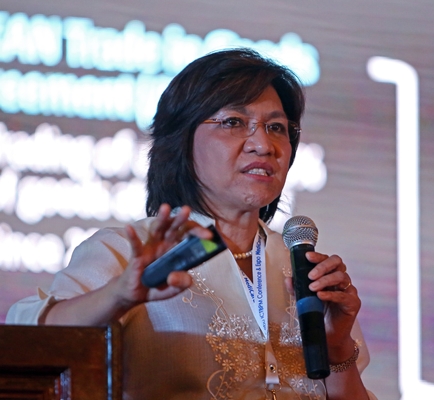
Department of Trade and Industry Undersecretary Nora Terrado at the Asean forum at Marco Polo hotel. (CDN PHOTO/LITO TECSON)
In order to move forward and compete when the Asean integration goes full blast next year, Trade Undersecretary Nora Terrado highlighted the need to focus on competitiveness, people development, innovation, regulatory reforms and a change in mindset.
Terrado said that while the integration had been slowly implemented since 2010, and we are already at 99.65 percent in the easing of flow of goods, we have yet to iron out implementations in the Afas or Asean Framework Agreement in Services.
One of the aims of the Asean integration is free flow of skills, which may impact into our labor market, said Terrado.
“Most countries have been doing something to improve their competitiveness which includes developing quality manpower. There are things we need to change in our educational system—curriculum and certification, to be at par with global standards,” she said.
In terms of competitiveness, Terrado said the Philippines is ranked 59 out of 148 countries.
“We are strong at macro- economic environment. We’re at the stage of factor-driven economy and transitioning slowly into efficiency-driven economy. Hopefully we can become an innovation-driven economy,” she said.
She cited the importance of information communication technology (ICT) as a growth industry, and the need to do more.
She said that we are still low at technology-readiness, labor efficiency, and infrastructure.
Among the Asean countries, Singapore is on top in terms of labor efficiency but low in market which explains why many Filipinos move to Singapore to work.
“The top destination of our skilled manpower are Singapore, Thailand and Malaysia which is influenced by many factors.”
Among the push factors that will make a Filipino decide to move and work abroad is the slow growth in the country, high unemployment, better wages offered abroad, our culture of dreaming to work abroad, and our policy that encourages more remittances.
Because of this, Terrado said it is important to work more on people development in the country to also be able to supply enough manpower for our own growth.
She also said that there’s a need for regulatory reforms because our country is one the “over regulated” countries.
She said it’s also important to change the mindset of the Filipino people.
She encouraged the Filipinos to look at the positive things and capitalize on them.
Terrano was the keynote speaker in yesterday’s opening of the two-day Cebu ICT/BPM Conference which also covered important topics in the growth of the industry towards catering to higher end services.
One of the topics tackled is the growth potential of the Health Insurance and Information Management (HIIM) sector of the Business Process Management industry.
During the panel discussion Information Technology and Business Process Association of the Philippines president and chief executive officer Jomari Mercado said that the industry target is $25 billion revenues from 1.3 million employee base.
“At present we are at 500,000 employees with $10 billion revenues. The HIIM can help us achieve the revenue target which is actually the same target as the OFW remittances only that it’s from 12 milllion people,” he said.
Last year revenue from HIIM grew by 114 percent according to Mercado with a billion dollars in revenue.
Mercado also discussed how the sector has addressed the talent skills supply gap in the industry.